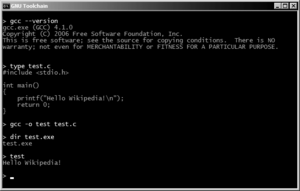DJGPP
 | |
|
The DJGPP environment, utilizing GCC | |
| Developer(s) | DJ Delorie |
|---|---|
| Stable release |
2.0.5
/ November 3, 2015[1] |
| Repository |
www |
| Operating system | DOS and Windows |
| Type | Compiler |
| License | GNU GPL |
| Website |
www |
DJ's GNU Programming Platform (DJGPP)[2] is a software development suite for Intel 80386-level and above, IBM PC compatibles which supports DOS operating systems. It is guided by DJ Delorie, who began the project in 1989. It is a port of the GNU Compiler Collection (GCC), and mostly GNU utilities such as Bash, find, tar, ls, GAWK, sed, and ld to DOS Protected Mode Interface (DPMI). Supported languages include C, C++, Objective-C/C++, Ada, Fortran, and Pascal. DJGPP was described as an "aging" product in 2004.[3]
Overview
The compiler generates 32-bit code, which runs natively in 32-bit protected mode while switching back to 16-bit DOS calls for basic OS support. However, unlike the Open Watcom C/C++ compiler, it is not a zero-based flat model due to preferring NULL pointer protection for better stability. It is currently based upon a variant of the COFF format. It can access up to 4 GB of RAM in pure DOS when using a suitable DPMI host (e.g., CWSDPMI r7 or HDPMI32).
Compatibility
DJGPP presents the programmer an interface which is compatible with the ANSI C and C99 standards, DOS APIs, and an older POSIX-like environment. Compiled binaries are long filename (LFN) aware and can handle such names under most 32-bit Windows by default, but they cannot use the Win16 or Win32 APIs that graphical programs on Windows need.[3] Terminate and Stay Resident (TSR) programs to support LFNs under plain DOS or Windows NT 4 are available.
While DJGPP runs in 32-bit protected mode, its stub and library heavily rely on many 16-bit DOS and BIOS calls. Because the x86-64 versions of Windows lack support for 16-bit programs,[4][5] there is no NTVDM, and DJGPP applications cannot be run. Under x86-64 systems these applications function only through emulation (e.g. DOSBox), x86 virtualization (e.g. VirtualBox), or similar (e.g. Linux's DOSEMU). This problem arises because in long mode x86-64 processors do not support the virtual 8086 mode used to run 16-bit code in IA-32 processors. Newer x86 CPUs with VT-x do support paged real mode and unrestricted guest mode execution.
See also
References
- ↑ Announce: DJGPP V2.05 Released, comp.os.msdos.djgpp, 3 November 2015
- ↑ Eli Zaretskii (Jul 1999). "The DJGPP Project". Retrieved 20 Jul 2009.
- 1 2 Wall, Kurt; Von Hagen, William (2004). The Definitive Guide to GCC. Apress. pp. 47–48.
- ↑ "Guide: What is DJGPP?". Retrieved November 22, 2015.
The target hardware platform for DJGPP programs is a PC platform ... running DOS ... or a DOS-compatible operating system DJGPP programs run under Windows' "dos prompt" boxes.
- ↑ Microsoft (Oct 2007). "List of limitations in 64-Bit Windows". Retrieved 18 May 2010.
16-bit MS-DOS and Microsoft Windows 3.x utilities will not start. If you attempt to start such a program, you receive a "Program.exe is not a valid Win32 application" error message.
